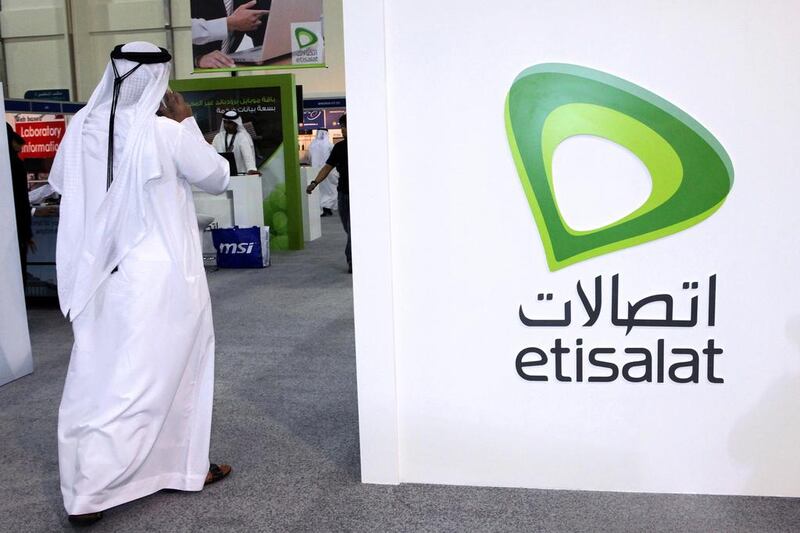Etisalat reported an 18 per cent drop in third quarter profit despite a 20 per cent rise in revenue.
The region’s largest telecoms operator made a net profit of Dh1.83 billion, a drop of Dh380 million compared to the same period last year. Capital spending rose by 39 per cent to Dh1.3bn as staff expenses increased, driven mainly by the consolidation of its operations in Pakistan. Ebitda increased 9 per cent to Dh4.6bn.
Consolidated revenues grew 20 per cent to Dh9.6bn and revenues from its international operations grew by 41 per cent to Dh3.4bn. The group’s international operations now account for 35 per cent of its total revenues.
“The Q3 results were positive across our operations, with consolidated revenues boosted by the positive performance of the group and by Etisalat UAE in particular,” said Eissa Al Suwaidi, the chairman of Etisalat Group in a statement issued on the Abu Dhabi Securities Exchange. “These results demonstrate that we are not only retaining our customers but also increasing our new customer base and that Etisalat Group has made sound strategic decisions across our operations.”
Revenues from its UAE operations came up to Dh6.17bn, or 64 per cent, of Etisalat’s third quarter revenue, a rise of 13 per cent when compared to the same period last year. The company’s performance in Egypt was less successful, hindered by the devaluation of the Egyptian pound against the dirham as revenues declined 14 per cent to Dh1.1bn.
“In general it is a stable quarter for Etisalat,” said Petr Molik, group chief financial officer and head of financial advisory at Menacorp. “I would not say it is struggling, overall it is a solid quarter. A big part of Etisalat’s revenues and profit come from the UAE, so you see the seasonality of the second and third quarters, which are usually weaker ,and the first and fourth quarters are strong because they are the tourist season.”
Etisalat’s unit in Pakistan has also made a non-binding offer for Abu Dhabi-based Warid Telecom, which has operations in Pakistan, Congo and Uganda in a deal that could be worth some $1bn.
Etisalat is also currently in talks with the French conglomerate Vivendi for its 53 per cent stake in Maroc Telecom in a deal worth almost Dh20bn. The operator expects to close its acquisition by the first quarter of next year. Last month it announced the period of exclusivity had been extended until Thursday.
“Even if the exclusivity period expires, it won’t be a problem to renew it. Maroc Telecom is such a big company and Etisalat needs to renegotiate some terms with the Moroccan government so there may be some delays there,” said Mr Molik.
“Vivendi would not delay the process, they would like to sell it as quickly as possible, so the issue may be with the kingdom of Morocco. The transaction of such size and complexity which involves not just Morocco and France but also several West African markets is not uncommon to have delays of two or three months.”
Etisalat Group recorded an 11 per cent increase in subscribers, reaching 144 million across the 15 markets in which it operates. Despite the rise, the company is increasingly under pressure as mobile penetration levels increase. With mobile number portability set to be introduced in the UAE by the end of this year, some analysts believe it may result in greater competition and a higher churn rate, that is customers opting to switch providers while keeping the same number.
thamid@thenational.ae





